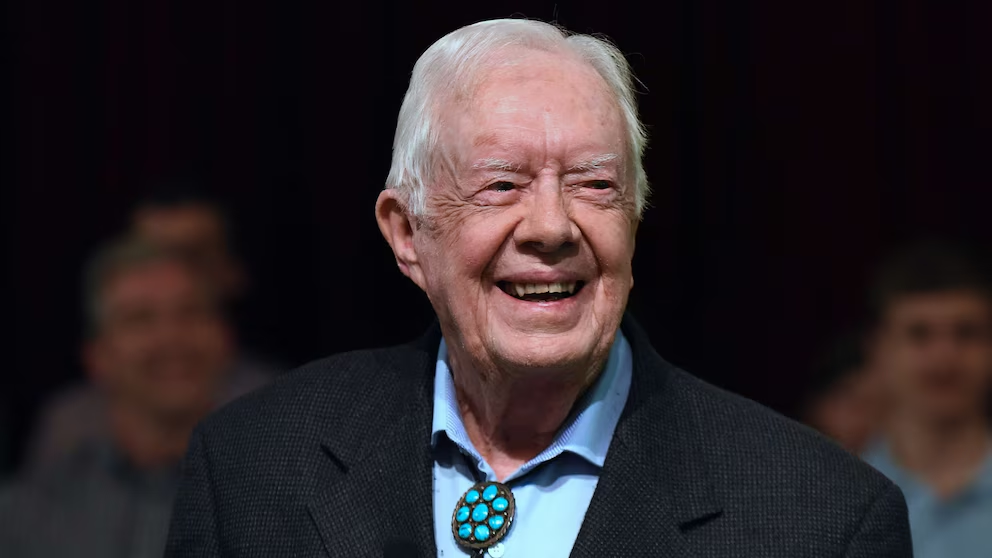
DHAKA, Dec 30, 2024 (BSS) - Jimmy Carter visited Bangladesh twice during his post presidency career that he took as a mission to spearhead the campaign for peace and promote human rights alongside making efforts to reduce sufferings of mankind.
Carter was the longest-lived president in US history and the first live to 100 years while most of his admirers and political analysts alongside the global leaders including Professor Dr Muhammad Yunus paid their tributes recalling his firm personal belief and commitment towards his mission.
But many of those who came across come across him in person even by chance found him as a simple guardian or school teacher like figure who felt like teaching something anew or correct someone's tinny mistakes without hurting him or her.
Carter visited Bangladesh for the second time in 2001 on behalf of the Carter Center and the Washington-based National Democratic Institute (NDI) resulted in the first serious meeting in years between rivals in upcoming parliamentary elections, during which they made commitments to ensure a democratic and peaceful election.
A press meet was staged as well at that time enabling Bangladeshi journalists to interact with him when a young reporter asked him a question addressing him "Mr. Former President".
In a smiling face, Carter told him that according to norms even the former presidents are called "Mr. President" (not former president), before replying his query.
According to the White House Historical Association, Carter was the only US president to have taught Sunday school while in office while Carter Center director Steven Hochman said in 2019 that the former president had taught more than 2,000 Sunday school lessons.
Time magazine said he taught Sunday school for most of his adult life until the point in 2020 when he physically couldn't anymore.
Carter was 52 years old when he assumed presidency, while he outlived his active political career as he lived for 66 years after leaving the White House.
During these 66 years he spent the decades as a humanitarian and advocate for peace - building houses with Habitat for Humanity, monitoring elections in dozens of countries, helping fight against diseases.
"In a few days I will lay down my official duties in this office, to take up once more the only title in our democracy superior to that of President, the title of citizen," Carter had said in his farewell address in 1980.
But the subsequent decades witnessed saw him taking up a greater role as a leading global peacemaker and rights activist as a former president.
His one-term presidency was marked by the highs of the 1978 Camp David accords between Israel and Egypt, bringing some stability to the Middle East while he is remembered in China for bringing an end to decades of hostility and establishing diplomatic relations with Beijing - at the expense of Taiwan.
"(But) in his long post presidency period, President Carter apparently contributed more to the cause of humanity. The people will remember that more," former Bangladeshi career diplomat ambassador Humayun Kabir told BSS.
Another former diplomat ambassador Mahfuzur Rahman said as a person he was led by his sense of moral and as a public or political leader he was more liberal even compared to other US presidents from the Democratic Party.
His first Bangladesh visit was for inauguration of a rural health project in the South Asian country as a former US President in 1986.
Chief Adviser Professor Dr Muhammad Yunus issued a statement mourning fellow Nobel Laureate Carter's death, recalled his personal interactions with him and termed him as a "true friend of Bangladesh".
Time magazine in a eulogy for the legendary figure, wrote "For President Jimmy Carter, morality was a personal obligation that became a national calling".
"Jimmy Carter is a saint," wrote Hendrik Hertzberg, a career journalist who also served as Carter's chief speechwriter while he was the US president.
Hertzberg wrote Carter believed in peace--in preventing war--and in human rights and these two values were the lodestars by which he guided his conduct of foreign affairs.
"And again, these values were expressions of his sense of religious and moral duty," he said.